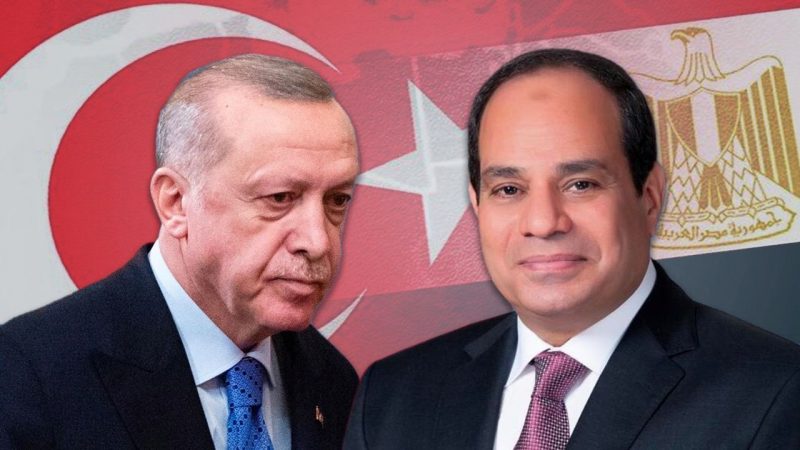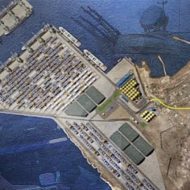Reporting from Cairo / Egypt
The visit of Turkish President Recep Tayyip Erdogan to Cairo gains its importance not only from the fact that it is the first to Egypt by a Turkish president in 12 years and after years of acute tension, but also from the fact that it comes at an extremely dangerous time in which fears are exacerbated that the confrontations in the region will expand into a large-scale regional war.
An implicit acknowledgment
The visit represents an implicit acknowledgment by both parties that their interests have been harmed by the deteriorating level of relations between them. This damage caused political and economic losses to Cairo and Ankara that benefited other parties in a way that harmed the stability of the region and marginalized its traditional balances in favor of artificial equations of influence that confounded all political efforts that have been made and are still being made to achieve stability, security and peace.
Based on this conclusion, each party came to the conviction of the necessity of direct and frank talk about its interests and the importance of each party understanding the interests of the other party. The search for common ground that achieves their interests, and the formulation of a common vision regarding many thorny regional issues, can no longer afford the luxury of waiting.
The visit was an embodiment of that conviction and the culmination of smart diplomatic efforts and successive and mutual signs of good faith, which lasted 3 years, and which succeeded in preparing public opinion in the two countries for the return of relations to normal in conjunction with the dismantling of the mines that caused this bad chapter in the history of common relations, so that the two countries could start a new page.
Although the visit of the Turkish President to Egypt represents confirmation of the great progress in rebuilding bilateral relations between the two countries, its importance is doubled if we view it as a founding visit for a new era that not only transcends differences, but also sets specific frameworks for the nature of cooperation between the two major capitals, beyond the limited level of bilateral cooperation to cooperate in controlling the territory’s rhythm before it is dragged into a deep gap from which it cannot escape.
A win-win situation
At the level of bilateral cooperation, there are 3 issues that represent the driving force towards a win-win situation.
The first of these issues is resolving the stalemate in Libya. The visit represents an important opportunity on the path to building understandings between the two countries that will lead to the expulsion of militias from this neighboring country of Egypt, especially since it represents a threat to Egyptian and Libyan national security.
This may be an essential step that leads to the completion of the Libyan presidential and parliamentary elections, thus enhancing the opportunities for Egyptian and Turkish companies to jointly benefit from the reconstruction process in the future.
Regarding the disputes surrounding the division of exclusive economic zones in the eastern Mediterranean, which represents an issue of great importance to Ankara, rapprochement with Egypt will enhance its opportunity to integrate under the umbrella of the Eastern Mediterranean Gas Forum, to achieve the greatest amount of benefit.
So far, Ankara is not a partner or party to most of the collective arrangements or interactions in the Eastern Mediterranean region.
The recent rapprochement with Egypt embodies Turkey’s success in penetrating the regional cooperation network that arose from the so-called tripartite partnerships (Egypt-Cyprus-Greece) and (Cyprus-Greece-Israel) and breaking the alignment against it within the organization.
Turkey seeks to win Egyptian support to join the forum and is also interested in signing a bilateral treaty to demarcate the maritime borders with Egypt. This situation will allow the countries of the Eastern Mediterranean basin to enter collective negotiations that will lead to the settlement of differences between them.
As for bilateral economic and military cooperation, achieving mutually satisfactory solutions to the two previous issues may be the great gateway to enhancing common economic interests.
The volume of trade exchange between the two countries now exceeds $10 billion. The two leaders agreed to work together to raise trade exchange to $15 billion over the next few years. In my opinion, this goal is modest in light of the capabilities and opportunities in the two countries. With a little serious effort and continued dialogue, this number can be doubled.
The constructive and positive path of relations would enhance cooperation in the defense and military sector through mutual arms deals, or joint military production projects. This had already begun to materialize even days before President Erdogan’s visit to Cairo, as Turkish Foreign Minister Hakan Fidan announced that Ankara would supply combat drones to Egypt.
Restoring stability to the region
Regarding cooperation between the two countries in efforts to restore stability in the region, Turkey and Egypt are opening a new page in the history of mutual relations, while the Gaza Strip has been exposed for months to Israeli aggression that does not adhere to any legal or humanitarian standards. This war placed the region on the verge of a volcano of instability, the repercussions of which could not be predicted in any way.
Therefore, it is not difficult to predict that this aggression occupied a large part of the discussions between the two Presidents, Erdogan and Sisi.
The two countries agree on the need to stop the war, intensify and accelerate the entry of aid into Gaza, and the importance of making serious efforts to resume the path of peace that leads to an independent Palestinian state. The conviction of the two countries on this path stems from the fact that the two-state solution is the most realistic solution to the conflict that has been going on for decades.
In my opinion, the two presidents realize that the continuation of the war is starting to put the entire region and all of its demons out of control. Therefore, given Turkey’s great political weight, everyone expects it to support the negotiations led by Cairo and Doha to implement a prolonged humanitarian truce, and any new efforts that may be made to limit the repercussions of the war or establish peace.
On the African level, and given the prominent Turkish presence on the continent, the visit will likely pave the way for adopting more effective moves to resolve the Sudanese crisis.
At the same time, we may find cooperation and coordination between Egypt and Turkey to deter moves that threaten Somalia’s sovereignty over its lands, especially regarding the Ethiopian threat, which was represented by the attempt of Addis Ababa to establish a military base and lease the port of Berbera in what is known as the secessionist Republic of Somaliland. These moves were categorically rejected by Cairo.
Turkey has great influence in Somalia, as the latter is home to the largest Turkish foreign military base. The Egyptian-Turkish consensus on this issue may prevent the division of Somalia, with its geostrategic implications for security in the Horn of Africa.
According to the sources I spoke to, there was agreement that the rapprochement between the two countries represents a starting point towards nullifying and weakening the regional balances that came to the fore during the past decade due to the tension between the two countries, which represented an opponent of their geopolitical weight. In their view, establishing the Supreme Strategic Council will be the beginning towards achieving this.









Leave a Reply